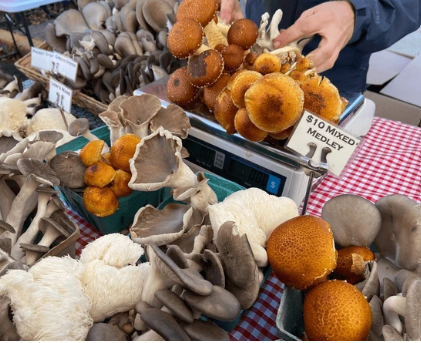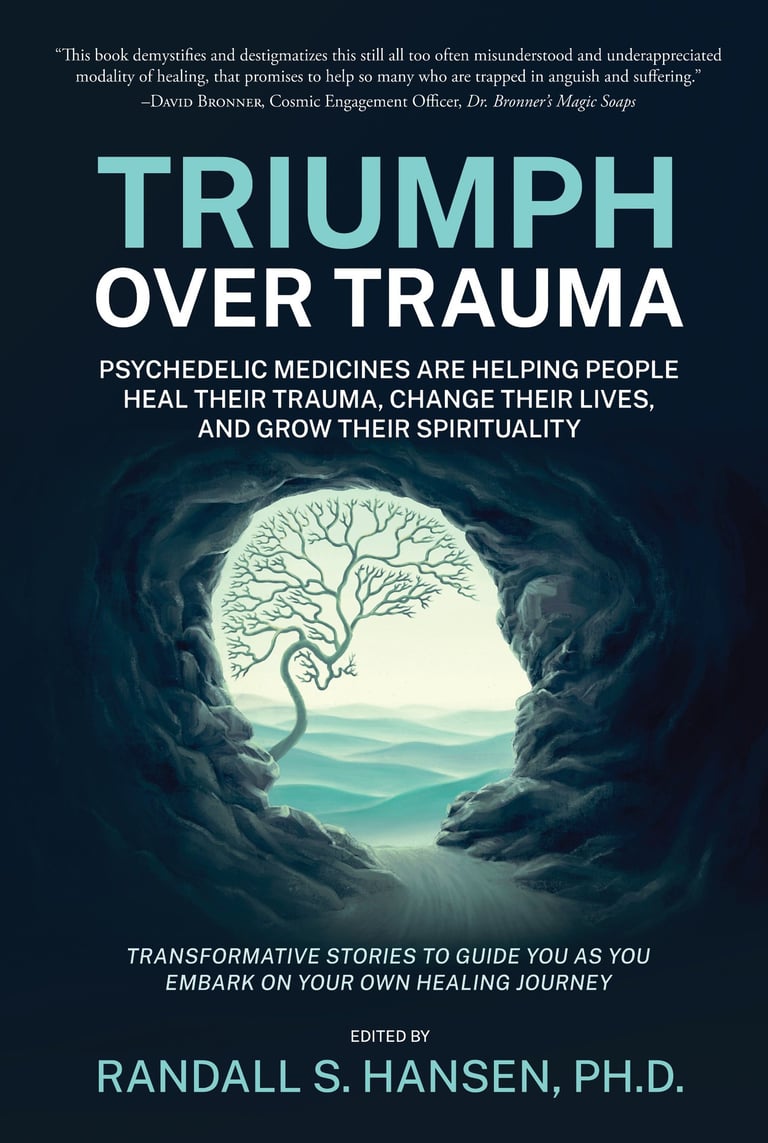Why Supplement With Medicinally Magical Mushrooms
For the many people who have watched Fantastic Fungi or who are simply mushroom lovers, the answer to why supplement with mushrooms is a no-brainer. Mushrooms dominate the Earth’s surface, mostly hidden from view until they fruit. (And if you haven’t watched the documentary, it’s on Netflix.)
Mushrooms are truly beneficial and belong in that superfood category that includes berries, green tea, olive oil, farm-fresh eggs, nuts and seeds, garlic, turmeric, salmon, and avocados.
That said, please do NOT go out and forage wild mushrooms on your own (unless you have mycology experience) because about 10-20 percent of mushrooms (depending on where you live) are poisonous and can kill you; instead, please buy your mushrooms from the farmer’s market or store. If buying a mushroom supplement, please research the brand carefully.
Medicinal mushrooms have essential vitamins and minerals that are extremely beneficial, with an antioxidant content not found in other foods that helps reduce inflammation, feed the gut microbiome, boost the immune system, and more. These beneficial elements include selenium, potassium, copper, iron, B6, riboflavin, folate, thiamine, pantothenic acid, niacin, and zinc.
This article examines some of the latest research on the health benefits of mushrooms and then discusses the key medicinal mushrooms that should be part of your life and diet.
As always, before jumping into adding lots of mushrooms to your cooking or taking supplements, do your own research and/or consult with a medical professional, especially if you are unhealthy and taking multiple prescription drugs.
Health Benefits of Medicinal Mushrooms
While many in Western cultures think of mushrooms as more culinary treats, several older cultures have long looked at these fungi as medicinal and beneficial… and we are finally seeing the research that supports their medicinal value.
1. Boosts the Immune System. Because mushrooms are high in antioxidants (especially ergothioneine and glutathione), mushrooms help prevent or slow cell damage while also activating elements in our immune system, which is critical to protecting us from infection and disease, with some research showing mushrooms may help prevent numerous types of cancer (including prostate, colorectal, and breast cancer).
2. Improves Gut Microbiome. The Western lifestyle has dramatically annihilated our gut health to the point that many of us have something called Leaky Gut, a condition in which toxins can enter our bloodstream. Consuming mushrooms, which contain prebiotics, helps balance the gut microbiome and assist in the growth of good bacteria.
3. Helps Protect Brain Health. Mushrooms are rich in polyphenols (along with coffee and cocoa), which have antioxidant and anti-inflammatory properties that may help protect the brain from neurodegenerative diseases such as Parkinson’s and Alzheimer’s, according to long-term studies conducted in Spain and Singapore.
4. Maintains Heart Health. Besides the polyphenols that help with heart health, other compounds found in mushrooms (such as potassium and vitamin C) has been found to help prevent plaque buildup in blood vessels.
5. Assists in Blood Sugar Regulation. Because mushrooms have a good amount of soluble fiber (including beta-glucans), they may help in reducing blood glucose levels – and assist in preventing insulin resistance (along with dietary changes).
6. Lowers Blood Pressure. The antioxidants and potassium found in mushrooms helps the body control blood pressure and may help lower blood pressure – and help in the fight against hypertension.
7. Boosts Mood. A Penn State study of almost 25,000 people found that people who regularly consumed mushrooms had a lower risk for depression, which the authors link to the amino acid ergothioneine. (Besides mushrooms, red and black beans are also high in ergothioneine,)
Key Medicinal Mushrooms For You
Almost all varieties of mushrooms are beneficial for our health; some are exceptionally good. Experts differ on the exact number, but here are the most commonly discussed medicinal mushrooms:
Lion’s Mane: Brain Booster. This mushroom has been used for both cooking and medicine in Asia for centuries, and appears to have many beneficial effects on the body -- especially on the brain, heart, and gut. In the brain, because these mushrooms have contain two special compounds that can stimulate the growth of brain cells (enhanced neuroplasticity), they help both in boosting brain power while also protecting the brain against memory loss and dementia. They also appear to stimulate the growth and repair of nerve cells, which may be especially beneficial for people with brain injuries. In studies on mice, these mushrooms exhibited anti-inflammatory effects, reducing symptoms of anxiety and depression. Test-tube studies also show they have anticancer properties and either kill or slow the growth of cancer cells. Finally, these mushrooms act a prebiotic, feeding and fueling the beneficial bacteria in the gut, improving and strengthening gut microbiome health.
Reishi: Immune System Superstar. Consider the nicknames for these mushrooms – “king of herbs” and “10,000 year-old mushroom” – because they contain beta-glucans, one of the most effective and powerful immune system boosters. They are very bitter and have been used in teas, but it’s best to consume these in capsule form. These mushrooms strengthen heart function, reduce inflammation, detoxify the body, lower blood pressure, reduce blood sugar, and increase and improve white blood cells, especially natural killer cells (which are key to protecting us from illness). They are also reported to help detoxify and improve the liver (which is especially important because of our sugary diet that causes serious liver issues). Other research shows they help prevent the release of histamine from mast cells in the body, thus helping prevent allergic reactions.
Cordyceps: Tumor Shrinker. These mushrooms have traditionally been cooked in soups in Asia. Studies from China have shown that these mushrooms shrink tumors and prolong life in mice; other research (done in test tubes) shows that they inhibit the growth of many types of human cancer cells, including lung, colon, skin and liver cancers. Yet other research suggests that they help increase the body’s production of adenosine triphosphate (ATP), which is every living cell's source of energy; thus, they are also shown to increase energy and endurance while reducing fatigue. Finally, they are beneficial for the gut, with research showing they help keep blood sugar levels within a healthy range by mimicking the action of insulin.
Turkey Tail: Earth’s Detoxifier. Because of their widespread availability around the world, these mushrooms have been some of the most studied/researched and are known for their strong anti-viral and anti-microbial properties. Paul Stamets, the world renowned mushroom expert, says these mushrooms can “heal the world” because of their ability to cleanse heavy metals and other toxins from the soil – and may help us do the same. They have been shown to provide support to the immune system, stimulate energy levels, and improve liver function. These mushrooms also have prebiotic elements, thus helping the growth of the good and beneficial bacteria and possibly assisting in the treatment of leaky gut syndrome. Finally, other studies have shown these mushrooms can improve bone health by aiding in regenerating bone marrow.
Shiitake: Anticancer Powerhouse. Known as the “elixir of life,” these mushrooms are celebrated for their anticancer and immune-boosting abilities. They have been cultivated and used in cooking for centuries because of their unique flavor and powerful health benefits, including having anticancer properties. They may also help with reducing inflammation, balancing the bacterial balance in the gut, lowering blood pressure, lowering cholesterol, and stimulating antiviral effects. Other research shows that these mushrooms may also aid in weight loss, strengthen the bones, and promote skin health. They may also play a key role in metabolism and energy production. Because of their high levels of several key antioxidants, they can significantly cut down on oxidative stress throughout the body.
Chaga: Longevity Agent. These mushrooms may be the secret ingredient missing in the research on longevity and Blue Zones because they have been found to have a multitude of health and life-enhancing benefits. They have been a cornerstone of traditional medicine for centuries, particularly in colder climates because they typically are found growing on birch trees.
Final Thoughts on Medicinal Mushrooms
All nonpoisonous mushrooms are superfoods, but especially the ones outlined in this article.
Eating these mushrooms and/or taking mushroom supplements can have a host of benefits, making them a superfood that should be part of your daily routine.
Mushrooms should be part of your plan to boost your immune system, help fix your gut, fight off disease and cancer, improve your brain, help with your mood, and propel longevity. Just remember that the mushrooms can’t do it alone – your diet and lifestyle are key, so make sure you are eating real foods and not the standard Western diet of prepared and packaged foods… and that you are moving/exercising daily.
Finally, for people following a plant-based diet (vegetarian or vegan), mushrooms are also a great source of protein.
Additional Medicinal Mushroom Sources
Dr. Randall Hansen is an advocate, educator, mentor, ethicist, and thought-leader... helping the world heal from past trauma. He is founder and CEO of EmpoweringSites.com, a network of empowering and transformative Websites, including EmpoweringAdvice.com.
He is the author of the groundbreaking Triumph Over Trauma: Psychedelic Medicines are Helping People Heal Their Trauma, Change Their Lives, and Grow Their Spirituality and the well-received HEAL! Wholeistic Practices to Help Clear Your Trauma, Heal Yourself, and Live Your Best Life.
Dr. Hansen's focus and advocacy center around true healing ... healing that results in being able to live an authentic life filled with peace, joy, love. Learn more by visiting his personal Website, RandallSHansen.com. You can also check out Dr. Randall Hansen on LinkedIn.







